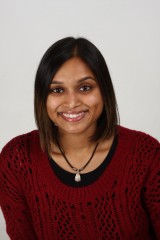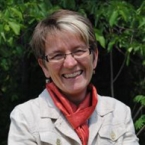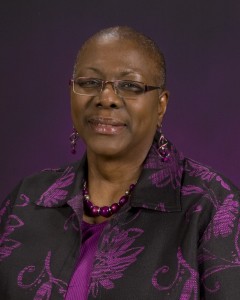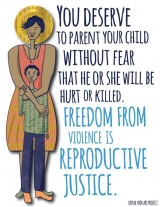Past Feminist Futures Lecture Series
Fall 2014
“Workers? Victims? Entrepreneurs? Sex worker organizing in neoliberal Costa Rica”
Speaker: Dr. Megan Rivers Moore
September 29, 2014
Abstract
This presentation explores how non-governmental organizations (NGOs), as new agents of gove rnance in the context of a downsized neoliberal state and shrinking gendered labour market, have impacted the possibility of struggle for sex workers’ human and labour rights. Based on participate observation, interviews with staff at NGOs and with sex workers in San José, Costa Rica, I argue that sex workers have gone from being seen as workers and subjects of labour rights in the 1990s, to victims that can be remade as entrepreneurs in the 2000s. In the context of neoliberal Costa Rica, this shift away from demanding workers’ rights toward saving victims and empowering entrepreneurs has had a significant impact on public discourses about sex workers, as well as on their future possibilities for recognition as workers.
rnance in the context of a downsized neoliberal state and shrinking gendered labour market, have impacted the possibility of struggle for sex workers’ human and labour rights. Based on participate observation, interviews with staff at NGOs and with sex workers in San José, Costa Rica, I argue that sex workers have gone from being seen as workers and subjects of labour rights in the 1990s, to victims that can be remade as entrepreneurs in the 2000s. In the context of neoliberal Costa Rica, this shift away from demanding workers’ rights toward saving victims and empowering entrepreneurs has had a significant impact on public discourses about sex workers, as well as on their future possibilities for recognition as workers.
_____________________________________________________________
“Undoing gender after migration: Gender egalitarianism or persistent gender essentialism among migrant families in Canada”
Speaker: Dr. Amrita Hari
October 20, 2014

Abstract
Despite the growing traction given to gender egalitarianism through the research and activist efforts of generations of feminists, persistent gender essentialism continues to push men and women in gender-typical paths, evident in migration policies, processes and participants. The household, in particular the gendered division of household labour, has long been recognized by feminists as an important arena to understand how structural and cultural changes contribute to the doing of gender, affect gendered identities, and indicate gender equality. Prior research has shown the impact of migration in the process of undoing gender by triggering gender-atypical work/family arrangements. The research presented examines the gendered division of household labour of skilled migrant families as they navigate the dual transition into the labour market and parenthood in a new host society and tests the assumption that the undoing of gender through migration is a catalyst to promote greater gender equality.
_____________________________________________________________
“‘In the game and I must be a soldier’: Gender, Class, and World War I Canadian Military Nurse Annie Green”
Speaker: Dr. Sandy Campbell
November 17, 2014
Abstract
Dr. Campbell’s paper examines the life and career of nurse Annie Green (1882-1929), a native of Eastern Ontario who trained as a nurse at Kingston General Hospital in the early years of the century. Green was a type of the new woman, and served as a military nurse in hospitals in England and Wales in the latter stages of World War I, experiencing not only the flood of the battlefield casualties invalided to England but also the Kinmel Camp Riots by Canadian soldiers in Wales at the end of the war. Campbell will draw on the rich collection of letters, photos and souvenir albums held at Queen’s University Archives and elsewhere on campus which document Green’s career held at Queen’s University to analyse Green’s life (and death) in the light of autobiographical theory, medical history, art history, class, gender and historical moment.
_____________________________________________________________
Winter 2015
“Sluts Who Deserve Nothing: Unwed Motherhood, Social Stigma, and the Social-Cultural Change”
Speaker: Dr. Karen March
January 12, 2015
A bstract
bstract
Using data gathered from semi-structured interviews with 33 reunited birth mothers, I describe how stereotypical images of female sexuality contributed to the women’s sense of shame over their unwed pregnancy and reinforced their decision to hide their birth mother status from others. By contrast, acceptance of contact from their placed child when he/she reached adulthood and public revelation of self as a birth mother was supported by their recognition of socio-cultural changes in the position of women since the adoption had occurred.
_____________________________________________________________
“Sleight of Hand: Marie-Anne Collot and the Production of the Bronze Horseman“
Speaker: Dr. Debra Graham
February 9, 2015
Abstract
French artist Marie-Anne Collot (1748-1821) is arguably one of the least known portrait sculptors in the history of Western art, yet her achievements rival the most seminal figures of the genre. Working in a “masculine” art form, Collot is unique as a female sculptor of the eighteenth century. Starting from humble beginnings as an artist’s model in Paris, she became one of the favou red sculptors in the court of Catherine the Great. Acting on a commission from the Russian Empress, she travelled to St. Petersburg in 1766 as assistant to Étienne-Maurice Falconet to design and construct the equestrian monument to Peter the Great, which has dominated Senate Square for more than 200 years.
red sculptors in the court of Catherine the Great. Acting on a commission from the Russian Empress, she travelled to St. Petersburg in 1766 as assistant to Étienne-Maurice Falconet to design and construct the equestrian monument to Peter the Great, which has dominated Senate Square for more than 200 years.
In Russia, she quickly established an impressive clientele, creating marble portrait busts of St. Petersburg’s nobility and French intellectual elites. The Tsarnia eventually demanded that the talented young Collot, rather than Falconet, sculpt the head for the legendary Emperor. During her dozen years of work on the commemorative statue (1766-1778), Collot also became the first Western woman to be inducted into Russia’s Imperial Academy of Arts (1767), and the first artist to sculpt the bust of Catherine the Great from life (1768).
Yet, Marie-Anne Collot is not the subject of any comprehensive book publication; she is not featured in accounts of great women artists; and she is not listed among the European masters of equestrian statuary. There are only a few Western art historical articles that document her art, mostly in French. As with a sleight of hand, Marie-Anne Collot has remained invisible behind the staging of the famous Bronze Horseman, so named by Aleksander Pushkin in his 1833 poem, which stands in tandem with the sculpture as epic works of art.
My research seeks to discover and reveal the circumstances and contributions of Marie-Anne Collot under the patronage of Catherine II in the creation, receptions, and interpretations of the Bronze Horseman.
_____________________________________________________________
FALL 2015
September 21, 2015
“The art of (doing) criminology: performance, pedagogy and research”
Speaker: Dr. Sylvie Frigon
![000021_SFrigonMMP_5747web[1]](http://carleton.ca/fist/wp-content/uploads/000021_SFrigonMMP_5747web1.jpg)
Abstract:
Criminology is an exciting and diverse interdisciplinary field of the Social Sciences in which current cutting-edge researchers are expanding the discipline demonstrating the fact that there is an art to doing criminology. Scholars are turning toward dynamic and artful emerging methodologies to work on a variety of criminal justice issues.
Art and culture provide us with myriad prisons rife for investigation. In this presentation, I discuss the ways in which we can use dance, more specifically, as way to teach about confinement. Two dance pedagogical projects (Ottawa U, 2012 and Carleton U, 2014) will be showcased in order to illustrate this.
Dance video at Carleton University (November 2014):
https://www.youtube.com/watch?v=ZXSkQMJhplI
2. Dance video at Université d’Ottawa (November 2012):
www.youtube.com/watch?v=FYfQ65sHf1g
Biography:
Sylvie Frigon holds a Ph.D. from the Institute of Criminology at the University of Cambridge, UK. She is professor of the Department of Criminology at the University of Ottawa where she teaches since 1993. Since July 2014, she is Joint Chair of the Women’s Studies at the University of Ottawa and Carleton University and was Visiting Fellow at Peterhouse, University of Cambridge, UK in 2014. She has published several scientific articles, chapters and books. In 2006, she has also published a novel entitled Écorchées on the issue of women in prison. This first fiction is being adapted to the theatre. She has completed three major research projects : 1. with Chris Bruckert on the social and professional (re)integration of women in conflict with the law (SSHRC); 2. On employment and women in prison with Véronique Strimelle (Ministry of Employment Québec); and 3. for Status of Woman Canada on the issue of mental health of women during and after imprisonment. Her book on dance, the body and imprisonment with Claire Jenny, choreographer and director of the Parisian dance company ” Point Virgule ” was published in 2009. Her children’s novel Ariane et son secret, on a little girl’s quest for her mother who is in prison is published in 2010. Professor Frigon has been awarded the Faculty of Social Sciences’ Teaching Excellence Award (2010-2011). In 2011, Ariane et son secret was finalist for the literary prize Le Droit and the Trillium Book Award. Her most edited book Corps suspect, corps déviant (Les éditions du Remue-ménage) was published in 2012. Professor Frigon collaborated with the AAOF (Association des auteures et auteurs de l’Onatrio français) as artistic director of a writing projet in prison. A book from these writing workshops has been published in 2014. In the Fall of 2012, in the graduate course CRM 6780, Claire Jenny, choreographer from Paris and co-author (Frigon and Jenny, 2009) offered dance workshops at the Old Ottawa Prison. See on YouTube : http://youtu.be/FYfQ65sHf1g. She is currently working on her 3rd novel funded by the Ontario Arts Council and works in partnership with The Grands Ballets canadiens of Montréal’s Centre for dance-therapy.
_____________________________________________________________
October 19, 2015
“Sexual Violence and ‘Conflict’ Minerals: Dis/ordering Insecurity”
Speaker: Dr. Doris Buss
 Abstract:
Abstract:
This presentation focuses on the relationship between women and the artisanal and small-scale mining (ASM) of so-called ‘conflict’ commodities on the African continent. International policy makers have posited a causal relationship between rape used by militias in the Democratic Republic of the Congo, and the mining of certain minerals – tin, tantalum, tungsten (3 Ts) and gold – that are said to effectively fund and thus deepen armed conflict and sexual violence in the region. This research draws on feminist political economy to consider the multiple ways in which women’s active economic activities in ASM are effectively sidelined in dominant accounts of the ‘rape and conflict commodities’ nexus. This sidelining of women’s livelihood strategies not only perpetuates a very male, patriarchal conception of ‘work’, but it contributes to the invisibilization of women’s labour inside mining zones. Uncovering women’s mining roles, I argue, challenges dominant representations of the nexus between insecurity and mining.
Biography:
I teach and research in the areas of international law and human rights, women’s rights, global social movements, and feminist theory. My research examines how gender equality and women’s rights norms are framed and contested in various international legal, regulatory and policy sites. Over the last few years, most of this work has concentrated on international responses, through international criminal prosecutions for example, to sexual violence during or as part of armed conflict. In this work I have explored how ‘rape as a weapon of war’ has come to predominant international conceptions of large-scale violence, such as the Rwanda genocide.
More recently, and in collaboration with colleagues in the Institute of African Studies at Carleton and civil society organizations in Canada and Africa, I am part of a new research network on women, violence and conflict economies on the African continent, and pursuing two large studies (with SSHRC and GrOW funding) of women’s livelihoods in artisanal and small-scale mining in six African countries. In this new direction, my work explores gender equality mainstreaming in post-conflict statebuilding, resource governance, and law reform projects on the African continent.
I am also part of an exciting new initiative at Carleton: the Gender Equality Measurement group, which critically interrogates different regimes for conducting, monitoring, and implementing gender equality commitments. In this work, we consider the epistemological, political and regulatory effects of the ‘measurement turn’ in public policy, both in Canada and internationally. I am the author (with Didi Herman) of Globalizing Family Values: The International Politics of the Christian Right (Minnesota Press, 2003), co-editor (with Ambreena Manji) ofInternational Law: Modern Feminist Approaches (Hart, 2005), and co-editor (with Joanne Lebert, Blair Rutherford, and Donna Sharkey) of Sexual Violence in Conflict and Post-Conflict Societies: International Agendas and African Contexts (Routledge, 2014).
_____________________________________________________________
November 23, 2015
“Navigating the Canadian Academy: Lessons from the experiences of an immigrant, Black woman”
Speaker: Dr. Joy Mighty

Abstract:
In this presentation, I describe some of the challenges faced by academics whose social identity represents an intersection of ethnicity, gender and race. Drawing on my research, and my own experiences as an immigrant woman of colour, I describe strategies that individuals use for dealing successfully with isolation, stereotyping, discrimination, and both covert and open racism. In addition, I explore implications for institutions and departments interested in creating inclusive environments that facilitate the success of minority members at various stages of the academic journey, from student to senior administrator.
Biography:
Dr Mighty holds a joint appointment as a Full Professor in the Sprott School of Business and the Pauline Jewett Institute of Women’s and Gender Studies in the Faculty of Arts and Social Sciences. She previously served as Director of the Centre for Teaching and Learning and Professor in the School of Business at Queen’s University. Prior to her work at Queen’s, she was the coordinator of the Teaching and Learning Centre and a professor in the Faculty of Business Administration at the University of New Brunswick.
Dr Mighty has an eclectic academic background and a wealth of experience as an administrator, teacher, educational developer, researcher and consultant. She obtained her B.A. (English Honours), Post-Graduate Diploma in Education, M.A.in Education and Post-Graduate Diploma in Management Studies from the University of the West Indies in Jamaica. She earned her MBA from Howard University in Washington, D.C., and her Ph.D. in Organizational Behaviour from the Schulich School of Business at York University in Toronto. She is also a Past President of the Society for Teaching and Learning in Higher Education, was the inaugural chair of the Educational Developers Caucus, and served as Canada’s representative on the Council of the International Consortium for Educational Development.
Dr Mighty has received awards for excellence in teaching, research, and extraordinary service and professional leadership. Her special interests are organizational development and change, as well as equity, diversity and the scholarship of teaching and learning. She has provided consulting services to private, public and not-for-profit organizations in more than ten countries. A frequently sought keynote speaker at regional, national, and international conferences, she has also published in various conference proceedings, journals and books, and is the co-editor of the highly acclaimed 2010 publication Taking Stock: Research on Teaching and Learning in Higher Education.
_____________________________________________________________
WINTER 2016
January 18, 2016
“Travel narrative and autobiography: Women Writers Between Countries, Genres and Styles”
Speaker: Dr. Roseann O’Reilly Runte
![president-runte[1]](http://carleton.ca/fist/wp-content/uploads/president-runte1-160x189.jpg)
Abstract:
Writing about Margaret Laurence’s The Prophet’s Camel Bell, George Woodcock said the book was “much more than a mere autobiographical document, a guide book to a large area of the mental world in which the novels, from This Side Jordan to The Diviners were conceived.” The statement holds true for most travel narratives and is modified by authorial purpose in travel and in writing, the genre selected, the distance between travel and composition/editing/publication and intended reader(s). Why did women choose to travel, to write about travel, place and space when they might follow Emily Dickenson’s thought, “to shut our eyes is to travel”? What explains widely divergent descriptions of a single location in a similar time frame? What is the relation between utopia and the fragmentary nature of travel narratives? Was travel escape, a way of creating and possessing one’s identity? Does Virginia Wolf’s statement hold true for women, like Turkish writer, Erdogan’s heroine in Rio, who appear to search desperately for a place of belonging: “As a woman, I have no country. As a woman, I want no country. As a woman, my country is the world?”
Biography:
Dr. Runte graduated with a BA summa cum laude in French from the State University of New York and obtained her MA and PhD from the University of Kansas. She has previously served as president of l’Université Sainte-Anne, principal of Glendon College, and president of Victoria University and of Old Dominion University. Dr. Runte is the author of numerous scholarly works in the fields of French and comparative literature and has written extensively on economic and cultural development, higher education and the importance of research.
In addition, she is a creative writer and has received a prize in poetry from the Académie française. She was also chair of the Board of the Foundation for International Training, a non-profit development services agency, vice-chair of the Board of the Gardiner Museum of Ceramic Art in Toronto, member of the Virginia Commission for Industry and Economic Development and the Virginia Shipbuilding Integration Center.
_____________________________________________________________
February 8, 2016
Hashtags Can’t Resuscitate: Reproductive Justice and Black Masculinity
Speaker: Dr. Grace Adeniyi Ogunyankin
Abstract:

I as a man of color do not have the right to seek to know in what respect my race is superior or inferior to another race. I recognize that I have one right alone: that of demanding human behavior from the other. There is no white world, there is no white ethic…(Fanon, 1967: 228 – 229)
Black lives matter. Especially when you’re a mother worried about reproductive justice issues that extend beyond a woman’s right to choose to the right to parent without fearing that your child will be in danger or killed. The presentation is about the anxieties I have about raising a black toddler son as a Nigerian immigrant mother who is a feminist. Part of the anxieties has arisen due to recent shootings of black males by police in the US and the excessive racial profiling of black males in Canada. Accordingly, I am concerned about how to raise him – on the one hand, I am trying to avoid caving in to discourses of racial “uplift”, and on the other hand, I am trying to ensure that he is not too hypersensitive to race from an early age (in terms of how I engage in teaching him about race and how to analyse what he perceives to be discriminatory attitude). The presentation also centers on how I have negotiated the tension and distinction between black masculinity and African masculinity and how this divide sometimes impedes allyship. In the spirit of Black History Month and hopes for a better feminist future, I reflect on the importance of solidarity, the interconnectedness of oppressions and the need for testimonial witnessing and humanization as key steps towards social justice.
Biography:
Grace Adeniyi Ogunyankin has a BA Hons in Global Development Studies and Psychology and a Master of Public Administration, both from Queen’s University. She recently obtained her PhD in Gender, Feminist and Women’s studies from York University. Grace is currently an Assistant Professor in Women’s and Gender Studies at Carleton University and is working on a book project on globalization, gender and the postcolonial politics of urbanism in Nigeria.